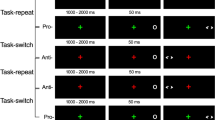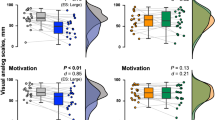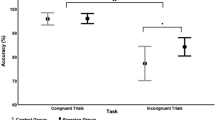Abstract
Sustained cognitive effort associated with the psychomotor vigilance task (PVT) increases objective and subjective measures of mental fatigue and elicits a post-PVT inhibitory control deficit. In contrast, passive exercise wherein an individual’s limbs are moved via an external force (i.e., mechanically driven cycle ergometer flywheel) provides a postexercise inhibitory control benefit linked to an exercise-based increase in cerebral blood flow. Here, we examined whether passive exercise performed concurrently with the PVT ‘blunts’ an inhibitory control deficit. On separate days, participants (N = 27) completed a 20 min PVT protocol (control condition) and same duration PVT protocol paired with passive cycle ergometry (passive exercise condition). Prior to (i.e., baseline), immediately after and 30 min after each condition inhibitory control was assessed via the antisaccade task. Antisaccades require a goal-directed eye movement (i.e., saccade) mirror-symmetrical to a target and provide an ideal tool for evaluating task-based changes in inhibitory control. PVT results showed that vigilance (as assessed via reaction time: RT) during control and passive exercise conditions decreased from the first to last 5 min of the protocol and increased subjective ratings of mental fatigue. As well, in the control condition, immediate (but not 30-min) post-intervention antisaccade RTs were longer than their baseline counterparts–a result evincing a transient mental fatigue-based inhibitory control deficit. For the passive exercise condition, immediate and 30-min post-intervention antisaccade RTs were shorter than their baseline counterparts and this result was linked to decreased subjective ratings of mental fatigue. Thus, passive exercise ameliorated the selective inhibitory control deficit associated with PVT-induced mental fatigue and thus provides a potential framework to reduce executive dysfunction in vigilance-demanding occupations.



Similar content being viewed by others
Data availability
Data will be made available on reasonable request.
Notes
An important consideration of Ogoh et al’s (2014) study is that Stroop Interference task performance was not evaluated over successive time points in a non-exercise (i.e., control) condition. Given that the Stroop task is influenced by practice-related effects (Davidson et al. 2003), it is possible that Ogoh et al.’s findings do not directly relate to an exercise-mediated inhibitory control benefit.
References
Ayala N, Heath M (2021) Pupillometry reveals the role of arousal in a postexercise benefit to executive function. Brain Sci 11:1048. https://doi.org/10.3390/brainsci11081048
Basner M, Hermosillo E, Nasrini J, McGuire Saxena S, Moore T et al (2018) Repeated administration effects on psychomotor vigilance test performance. Sleep. https://doi.org/10.1093/sleep/zsx187
Brainard DH (1997) The Psychophysics Toolbox. Spat Vis 10:433–436
Buysse DJ, Reynolds CF III, Monk TH, Berman SR, Kupfer DJ (1989) ThePittsburgh sleep quality index: a new instrument for psychiatric practice and research. Psych Res 28:193–213. https://doi.org/10.1016/0165-1781(89)90047-4
Chang YK, Labban JD, Gapin JI, Etnier JL (2012) The effects of acute exercise on cognitive performance: A meta-analysis. Brain Res 1453:87–101. https://doi.org/10.1016/j.brainres.2012.02.068
Connell CJ, Thompson B, Turuwhenua J, Srzich A, Gant N (2017a) Effects of dopamine and norepinephrine on exercise-induced oculomotor fatigue. Med Sci Sport Exer 49:1778–1788. https://doi.org/10.1249/MSS.0000000000001307
Connell CJ, Thompson B, Turuwhenua J, Srzich A, Gant N (2017b) Fatigue-related impairments in oculomotor control are prevented by norepinephrine-dopamine reuptake inhibition. Sci Rep 7:1–12. https://doi.org/10.1038/srep42726
Davidson DJ, Zacks RT, Williams CC (2003) Stroop interference, practice and aging. Neuropyschol Dev Cogn B Aging 10:85–98. https://doi.org/10.1076/anec.10.2.85.14463
Deckers K, Schievink SH, Rodriquez MM, Van Oostenbrugge RJ, Van Boxtel MP, Verhey FR, Köhler S (2017) Coronary heart disease and risk for cognitive impairment or dementia: systematic review and meta-analysis. PLoS ONE 12:e0184244. https://doi.org/10.1371/journal.pone.0184244
DeSimone JC, Weiler J, Aber GS, Heath M (2014) The unidirectional prosaccade switch-cost: Correct and error antisaccades differentially influence the planning times for subsequent prosaccades. Vision Res 96:17–24. https://doi.org/10.1016/j.visres.2013.12.005
Diamond A (2013) Executive functions. Ann Rev Psychol 64:135–168. https://doi.org/10.1146/annurev-psych-113011-143750
Dinges DF, Powell JW (1985) Microcomputer analyses of performance on a portable simple visual RT task during sustained operations. Behav Res Meth Instr Comp 17:652–655
Drummond SP, Bischoff-Grethe A, Dinges DF, Ayalon L, Mednick SC, Meloy MJ (2005) The neural basis of the Psychomotor Vigilance Task. Sleep 28:059–1068. https://doi.org/10.1093/sleep/28.9.1059
Gillen C, Heath M (2014) Perceptual averaging governs antisaccade endpoint bias. Exp Brain Res 232:3201–3210. https://doi.org/10.1007/s00221-014-4010-1
Godin G (2011) The Godin-Shephard leisure-time physical activity questionnaire. Health Fit J Canada 4:18–22
Graw P, Kräuchi K, Knoblauch V, Wirz-Justic A, Cajochen C (2004) Circadian and wake-dependnet modulation of fastest and slowest reaction times during the psychomotor vigilance test. Physiol Behav 80:695–701. https://doi.org/10.1016/j.physbeh.2003.12.004
Heath M, Dunham K, Binsted G, Godbolt B (2010) Antisaccades exhibit diminished online control relative to prosaccades. Exp Brain Res 203:743–752. https://doi.org/10.1007/s00221-010-2290-7
Herold F, Aye N, Lehmann N, Taubert M, Müller NG (2020) The contribution of functional magnetic resonance imaging to the understanding of the effects of acute physical exercise on cognition. Brain Sci 10:175. https://doi.org/10.3390/brainsci10030175
Hoffmann A, Ettinger U, Montoro C, Reyes del Paso GA, Duschek S (2019) Cerebral blood flow responses during prosaccade and antisaccade preparation in major depression. Eur Arch Psychiatry Clin Neurosci 269:813–822. https://doi.org/10.1007/s00406-018-0956-5
Hung TM, Tsai CL, Chen FT, Wang CC, Chang YK (2013) The immediate and sustained effects of acute exercise on planning aspect of executive function. Psychol Sport Exercise 14:728–736. https://doi.org/10.1016/j.psychsport.2013.05.004
Ishihara T, Drollette ES, Ludyga S, Hillman CH, Kamijo K (2021) The effects of acute aerobic exercise on executive function: A systematic review and meta-analysis of individual participant data. Neurosci Biobehav Rev 128:258–269. https://doi.org/10.1016/j.neubiorev.2021.06.026
Ishii A, Tanaka M, Watanabe Y (2014) Neural mechanisms of mental fatigue. Rev Neurosci 25:469–479. https://doi.org/10.1515/revneuro-2014-0028
Joyce J, Graydon J, McMorris T, Davranche K (2009) The time course effect of moderate intensity exercise on response execution and response inhibition. Brain Cog 71:14–19. https://doi.org/10.1016/j.bandc.2009.03.004
Knaepen K, Goekin M, Heyma EMM (2010) Neuroplasticity–exercise-induced response of peripheral brain-derived neurotrophic factor. Sports Med 40:765–801. https://doi.org/10.2165/11534530
Krigolson OE, Hassall CD, Satel J, Klein RM (2015) The impact of cognitive load on reward evaluation. Brain Res 1627:225–232. https://doi.org/10.1016/j.brainres.2015.09.028
Lakens D (2017) Equivalence tests: A practical primer for t tests, correlations, and meta analyses. Soc Psychol Personal Science 1:259–269. https://doi.org/10.1177/1948550617697177
Lambourne K, Tomporowski P (2010) The effect of exercise-induced arousal on cognitive task performance: A meta-regression analysis. Brain Res 1341:12–24. https://doi.org/10.1016/j.brainres.2010.03.091
Loy BD, O’Connor PJ, Dishman RK (2013) The effect of a single bout of exercise on energy and fatigue states: A systematic review and meta-analysis. Fatigue: Biomedicine. Health Behav 1:223–242. https://doi.org/10.1080/21641846.2013.843266
Matthews G, Warm JS, Reinerman-Jones LE, Langheim LK, Washburn DA, Tripp L (2010) Task engagement, cerebral blood flow velocity, and diagnostic monitoring for sustained attention. J Exp Psychol App 16:187–203. https://doi.org/10.1037/a0019572
Möller MC, Johansson J, Matuseviciene G, Pansell T, Deboussard CN (2019) An observational study of trait and state fatigue, and their relation to cognitive fatigability and saccade performance. Concussion. 4:62. https://doi.org/10.2217/cnc-2019-0003
Moore CI, Cao R (2008) The hemo-neural hypothesis: On the role of blood flow in information processing. J Neurophysiol 99:2035–2047. https://doi.org/10.1152/jn.01366.2006
Munoz DP, Everling S (2004) Look away: the anti-saccade task and the voluntary control of eye movement. Nat Rev Neurosci 5:218–228. https://doi.org/10.1038/nrn1345
Munoz DP, Waitzman DM, Wurtz RH (1996) Activity of neurons in monkey superior colliculus during interrupted saccades. J Neurophysiol 75:2562–2580. https://doi.org/10.1152/jn.1996.75.6.2562
Nóbrega AC, Araujo CG (1993) Heart rate transient at the onset of active and passive dynamic exercise. Med Sci Sports Exer 25:37–41
Ogoh S (2017) Relationship between cognitive function and regulation of cerebral blood flow. J Physiol Sci 67:345–351. https://doi.org/10.1007/s12576-017-0525-0
Ogoh S, Tsukamoto H, Hirasawa A, Hasegawa H, Hirose N, Hashimoto T (2014) The effect of changes in cerebral blood flow on cognitive function during exercise. Physiol Rep 2:12163. https://doi.org/10.14814/phy2.12163
Pastier N, Jansen E, Boolani A (2022) Sleep quality in relation to trait energy and fatigue: an exploratory study of healthy young adults. Sleep Sci 15:375. https://doi.org/10.5935/1984-0063.20210002
Pierrot-Deseilligny C, Rivaud S, Gaymard B, Müri R, Vermersch AI (1995) Cortical control of saccades. Ann Neurol 37:557–567. https://doi.org/10.1002/ana.410370504
Pontifex MB, McGowan AL, Chandler MC, Gwizdala KL, Parks AC, Fenn K, Kamijo K (2019) A primer on investigating the after effects of acute bouts of physical activity on cognition. Psychol Sport Exerc 40:1–22. https://doi.org/10.1016/j.psychsport.2018.08.015
Renke MB, Marcinkowska AB, Kujach S, Winklewski PJ (2022) A systematic review of the impact of physical exercise-induced increased resting cerebral blood flow on cognitive functions. Front Aging Neurosci 4:803332. https://doi.org/10.3389/fnagi.2022.803332
Shirzad M, Tari B, Dalton C, Van Riesen J, Marsala M, Heath M (2022) Passive exercise increases cerebral blood flow velocity and supports a postexercise executive function benefit. Psychophysiology 59:e14132. https://doi.org/10.1111/psyp.14132
Shukla D, Heath M (2022) A single bout of exercise provides a persistent benefit to cognitive flexibility. Res Q Exerc Sport 93:516–527. https://doi.org/10.1080/02701367.2021.1873902
Skalski S, Dobrakowski P (2020) Vigilance, inhibitory control and regional cerebral blood oxygenation in the PFC-differences in ADHD types of presentations. Adv Cogn Psychol 16:202–212. https://doi.org/10.5709/acp-0297-5
Smith KJ, Ainslie PN (2017) Regulation of cerebral blood flow and metabolism during exercise. Exp Physiol 102:1356–1371. https://doi.org/10.1113/ep086249
Smith MR, Chai R, Nguyen HT, Marcora SM, Coutts AJ (2019) Comparing the effects of three cognitive tasks on indicators of mental fatigue. J Psychol 153:759–783. https://doi.org/10.1080/00223980.2019.1611530
Tari B, Vanhie JJ, Belfry GR, Shoemaker JK, Heath M (2020) Increased cerebral blood flow supports a single-bout postexercise benefit to executive function: Evidence from hypercapnia. J Neurophysiol 124:930–940. https://doi.org/10.1152/jn.00240.2020
Tari B, Shirzad M, Behboodpour N, Belfry GR, Heath M (2021) Exercise intensity-specific changes to cerebral blood velocity do not modulate a postexercise executive function benefit. Neuropsychologia 161:108018. https://doi.org/10.1016/j.neuropsychologia.2021.108018
Tari B, Ahn J, Dalton C, Choo SY, Heath M (2023) Cerebral blood flow and immediate and sustained executive function benefits following single bouts of passive and active exercise. Brain Cogn 166:105953. https://doi.org/10.1016/j.bandc.2023.105953
Van der Linden D, Frese M, Meijman TF (2003) Mental fatigue and the control of cognitive processes: Effects on perseveration and planning. Acta Psychol 113:45–65. https://doi.org/10.1016/S0001-6918(02)00150-6
Wang CA, Brien DC, Munoz DP (2015) Pupil size reveals preparatory processes in the generation of pro-saccades and anti-saccades. Eur J Neurosci 41:1102–1110. https://doi.org/10.1111/ejn.12883
Warburton D, Jamnik V, Bredin S, Shephard R, Gledhill N (2021) The 2021 physical activity readiness questionnaire for everyone (PAR-Q+) and electronic physical activity readiness medical examination (ePARmed-X+): 2021 PAR-Q+. Health Fit J Canada. 14:83–87. https://doi.org/10.14288/hfjc.v14i1.351
Weiler J, Heath M (2014) Oculomotor task switching: Alternating from a nonstandard to a standard response yields the unidirectional prosaccade switch-cost. J Neurophysiol 112:2176–2184. https://doi.org/10.1152/jn.00352.2014
Wenban-Smith MG, Findlay JM (1991) Express saccades: Is there a separate population in humans? Exp Brain Res 87:218–222. https://doi.org/10.1007/bf00228523
Wurtz RH, Albano JE (1980) Visual-motor function of the primate superior colliculus. Ann Rev Neurosci 3:189–226. https://doi.org/10.1146/annurev.ne.03.030180.001201
Zouhal H, Jacob C, Delamarche P, Gratas-Delamarche A (2008) Catecholamines and the effects of exercise, training and gender. Sports Med 38:401–423. https://doi.org/10.2165/00007256-200838050-00004
Funding
This work is supported by a Discovery Grant (MH) from the Natural Sciences and Engineering Research Council (NSERC) of Canada, and Faculty Scholar and Major Academic Development Fund Awards from the University of Western Ontario.
Author information
Authors and Affiliations
Contributions
JA, BT, AM, HP and MH conceived and designed the research, JA, BT and AM performed experiments; JA and MH analyzed data; JA and MH interpreted results of experiments; MH prepared figures; MH drafted the manuscript; JA, BT, AM and HP edited and revised the manuscript; JA, BT, AM, HP, and MH approved the final version of the manuscript.
Corresponding author
Ethics declarations
Conflict of interest
The authors have no competing interests to declare that are relevant to the content of this article.
Ethical approval
This work was approved by the Non-Medical Research Ethics Board, University of Western Ontario (ID: 120485) and was conducted according to the most recent iteration of the Declaration of Helsinki.
Additional information
Communicated by Bill J Yates.
Publisher's Note
Springer Nature remains neutral with regard to jurisdictional claims in published maps and institutional affiliations.
Rights and permissions
Springer Nature or its licensor (e.g. a society or other partner) holds exclusive rights to this article under a publishing agreement with the author(s) or other rightsholder(s); author self-archiving of the accepted manuscript version of this article is solely governed by the terms of such publishing agreement and applicable law.
About this article
Cite this article
Ahn, J., Tari, B., Morava, A. et al. A single bout of passive exercise mitigates a mental fatigue-induced inhibitory control deficit. Exp Brain Res 241, 1835–1845 (2023). https://doi.org/10.1007/s00221-023-06640-7
Received:
Accepted:
Published:
Issue Date:
DOI: https://doi.org/10.1007/s00221-023-06640-7




